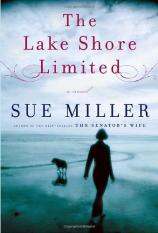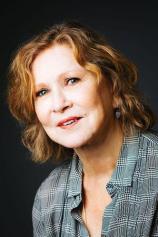Author Talk: April 23, 2010
AUTHOR TALK
April 23, 2010
Sue Miller is the bestselling author of 11 books, including THE SENATOR’S WIFE, LOST IN THE FOREST and THE WORLD BELOW. Her latest work, THE LAKE SHORE LIMITED, is a story within a story that examines the feelings of trauma and loss experienced by four people after the death of a loved one on 9/11. In this interview, Miller discusses what initially inspired the plot of this novel, and explains the role each of the four characters plays in the book’s theme of understanding the transformative power of art. She also gives us insight into her lengthy writing process and shares details about a few upcoming projects in the works.
Question: THE LAKE SHORE LIMITED takes its title from the famous train, but it is also the title of a play embedded within this novel --- a play about a terrorist bombing of that train as it pulls into Union Station in Chicago, and a man waiting to hear whether his estranged wife is among the survivors. Billy Gertz, the woman who's written the play, has waited in just such a way on 9/11 to hear whether her lover, Gus, was on one of the planes used in that attack. Was there one event in particular that sparked the idea for THE LAKE SHORE LIMITED?
Sue Miller: Yes. The spark came from a friend who had a relationship that would have ended sooner than it did had not her lover’s brother died on 9/11. While this situation is not like the one I created for Billy, my fictional playwright, the situation started me thinking about the far reach of such an event; and the variety of responses that play out around it, even at some distance. And the way in which the responses may be based in feelings that might be not the expected one --- ie, the way in which sometimes we’re called on to enact something we don’t feel, and the discomfort and sense of alienation from ourselves that comes from that.
Q: Much of the book centers around the characters’ reactions to Billy’s play, The Lake Shore Limited. How and why did you structure the book as, in essence, a play within a play?
SM: As I began to include some of the lines from the play and create scenes in rehearsal, it began to seem more important to me. It began to seem central to the book, actually. I began to see the book as at least in part a kind of speculation on how the experience of art can be transforming in life --- for those who create it, as Billy and also Rafe, the actor, do; and for those who take it in and ponder it and ask about its connections to their own lives. And then, I suppose, I just got interested in the play, too --- in writing it, at least the part you read in the book.
Q: Billy Gertz is a playwright. You, Sue Miller, are a fiction writer. There is seemingly much overlap between these two professions. At one point, Billy is having an argument with her lover, Gus. Gus is upset that Billy used a private moment between the two of them in one of her plays. Billy says, “I use me, Gus…. I use me up. I need all of me, and if you’re with me, that means I use you, too. I use everything. How could I not? And what I don’t use, I don’t use because it doesn’t work. Not because it’s sacred…. Nothing is sacred. That’s just the way it is.” Is this a conversation taken from your own life?
SM: I had originally thought of making Billy a director, a director who would be working on a play like The Lake Shore Limited. But then I began to think that I wanted the connection between what she was working on and her own experience with Gus to be more than coincidence, or accident, so I made her the playwright. And while I’ve never had exactly the conversation Billy has with Gus, I’ve often thought about what the limits are for writers in terms of what they use of their own lives, and others’. There are obviously great differences in the way writers work with the material they come by through living in families, having lovers and spouses, children, friends --- even pets. I think I probably fall about in the middle in terms of making use of such material --- not as close to the bone as some, not as distanced as others seem, anyway. In the end, though, we all call up what we know. Perhaps the greater difference then is in the degree of transformation of the material. And perhaps part of the reason I’ve never had the discussion Billy has with Gus with anyone in my own life is that I’ve transformed what I’ve used. The transformation is the point.
Q: Have you always been a fan of the theatre? Could you see yourself writing a play one day?
SM: I’ve always been interested in seeing and reading plays, though occasionally I’ve felt the way the character Pierce, in the book, does --- that they’re too damned THEATRICAL. But the form interests me, as dialogue in my books has always interested me, and I could --- can --- imagine writing a play.
Q: The viewpoint in THE LAKE SHORE LIMITED flips amongst four characters, two male (Rafe and Sam) and two female (Leslie and Billy) all of whom are at various ages and stages of their life. Why did you choose to cast the book in this way?
SM: I wanted the book to look at the way this play strikes a variety of people. I had Billy nearly from the start of thinking about the book, and Leslie came next, because I knew I wanted two versions, two understandings, of what the real story was about Billy and Gus, with the play mediating between them. But I wanted to broaden the impact of the play too --- to have it speak not just to the people directly involved, but to others, with other stories. Rafe and his life came next, more or less in a rush of note-making and writing. Sam’s was last, and most complicated to develop --- though I knew from the start about his connection with Leslie.
Q: You so eloquently write about the interior lives of people who are trying to understand their feelings, their relationships, themselves. How do you create such three dimensional characters, each with their own vivid and complicated pasts?
SM: Now THIS is the kind of question I like, wrapped neatly in a compliment. And I think I’ve started an answer with my response to the last question. But let me also say that this is one of the most pleasurable aspects of writing for me --- the construction of lives and histories. The process of imagining them so deeply as to feel I actually know these other people, these other stories. A way of escaping myself, I suppose.
Q: How do you research the specifics of what you write about? For instance, how did you know the specifics of producing a play?
SM: With each book I do, there is usually at least a little research. Sometimes I can get there by reading, and I did do a lot of reading about 9/11 for this book, actually, and the experiences of people who lost family on that day as well as the history of how it happened, the timeline of the planes, the story of the telephone calls --- even the book THE COMMISSION. A lot of that didn’t make it into the book, but that wasn’t the point. The point was to feel that I could begin to understand it. As for the play, I sat in on the production of a play at the Aurora Theater in Berkeley in the spring of 2008, watching and making notes from the early stage of talk around a table about what the actors thought was intended, to the choreographing of a fight scene, to the final production. It was fascinating and not just helpful --- necessary.
Q: You teach English at Smith College. What is the best advice you give to aspiring writers?
SM: Read.
Q: Tell us a little about your writing process --- how you write, when etc?
SM: I make a lot of notes before I write. I want to know what I’m doing. Where I’m going. I want to feel that I’m working on a whole thing, the idea for which I have clear in my mind --- the way perhaps an architect would know what he wanted to do without knowing every detail of it from the start; or a composer might know what he wanted a piece of music to do, the way he wanted it to move, without knowing all the themes in it. I write in longhand for the first draft, typing it in when I feel ready to work on revision. Sometime that’s a small piece --- a chapter --- sometimes a longer chunk of the book. I type it in, pull it out and write all over it again in longhand, type it in again, pull it out, etc. etc. I try to write in the morning, before I get enmeshed in the demands of daily life --- though those are all easier now that I don’t have responsibility for a child. Towards the end of a book, I write longer days.
Q: What’s next for you?
SM: I’ve signed a contract with Knopf for a new novel I’ve described to them, so I’ll be working on that for a few years. I’d like to try, anyway, to write Billy’s play --- The Lake Shore Limited. And I have a two-year-old granddaughter I’d like to spend as much time with as I can.
© Copyright 2010, Knopf, an imprint of Random House, Inc. All rights reserved.
• Click here now to buy this book from Amazon.com.




